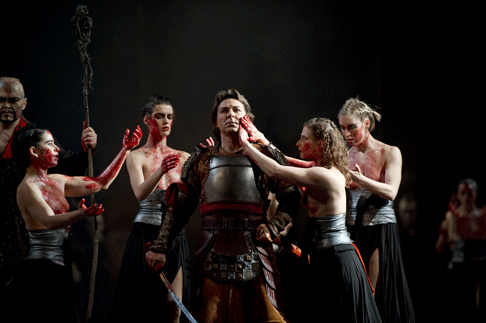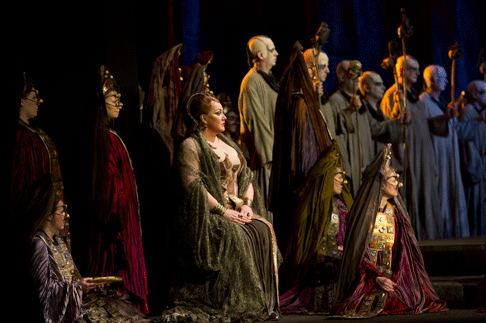David McVicar’s
production, first seen in 2010 and here given its first revival, never wavers
in its presentation of grotesque barbarism and sexual abandon —
blood-thirsty gladiators run amok among nubile, naked maidens etc. — and
while such goings-on may not be to everyone’s taste (indeed, some might
argue that ‘taste’ doesn’t feature strongly in the
proceedings), McVicar certainly injects freshness into Verdi’s old
warhorse, thankfully avoiding the kitsch of cod-Egyptiana.
The first challenge for the audience is a visual one: for Jean-Marc
Puissant's sets reject the beauty and exoticism of ancient Egypt in favour of
dull modern industrialism: a huge wall of scaffolding, harshly illuminated by
diagonal strip lights, dominates the stage. Not an elephant or sphinx in sight;
but also little visual beauty to complement the tenderness of the delicate
lines that open Verdi’s magical prelude. We are among a barbaric,
theocratic society, one driven by human sacrifice: salacious human slaughter
blesses Radamès’ departure for war, and the victims’ bloodied
bodies are hoisted to form a canopy of carcasses to celebrate his return.
Clearly McVicar wants to emphasise the soullessness of this brutal,
compassionless community. But, at times he struggles to sustain consistency;
for example, the eclectic, international selection of primitive tribal dress
worn by the cast seems to have little to do with the gloomy dystopian
landscape.
In the absence of a coherent mise-en-scène, it’s left to the
singers themselves to provide dramatic logic and focus; and here the problems
start, for the cast, while rich in musical talents, display a dearth of
interest in communicating narrative or engaging emotionally with each other,
preferring the stand-and-deliver approach, bellowing into the auditorium
apparently impervious to the manic action occurring behind them.
There are two casts for this revival. Only one member of the original cast,
Micaela Carosi, was expected to reprise her role, as the eponymous princess in
the ‘Cast A’ performances; however, due to pregnancy (the official
line goes …) she withdrew and was replaced at short notice by the
Ukrainian soprano, Liudmyla Monastyrska. Making her house debut — she is
to return in May as Lady Macbeth in Phyllida Lloyd’s production —
Monastyrska revealed a powerful, opulent voice, firm and controlled in the
lower register (in ‘Presago il core’, for example), and full in
tone right to the top; in her great Nile scene aria, ‘O patria
mia’, she floated the fiendish final phrases with ease, her breath
control superb. At times, she made effective use of a dusky, exotic colouring,
but it’s a shame that it was impossible to distinguish a single word of
the text, and she didn’t quite have the confidence to risk the true
pianissimos that the score demands.
 Roberto Alagna as Radames and Priestesses
Roberto Alagna as Radames and Priestesses
Roberto Alagna has an uneven history in the role of Radamès (audience
displeasure with his ‘Celeste Aida’ led to his infamous walk-out at
La Scala in 2006), and some have judged his voice too small for the part.
However, here he showed that he now has the required vocal power; brimming with
confidence, he never once lessened the ardour. Indeed, this was a puffed-up,
machismo reading of Radamès, and again there was little in the way of what one
might call acting. He opted out of the morendo on the high B♭
at the close of ‘Celeste Aida’, choosing instead the less risky
alternative of repeating the final phrase slightly less loudly. A lack of
nuance diminished the poignancy of the final duet (and the bare stage suggested
that McVicar had run out of ideas by the later acts), but overall there was
plenty of heroic strength and earnestness, which seemed to satisfy the
crowd.
As Amneris, Russian mezzo soprano Olga Borodina was similarly impressive in
vocal stature, and she achieved a true Verdian colour and warmth. She shared
the theatrical weaknesses of the other principals, but her stunning, burnished
tone was apt compensation. Dramatic credibility was restored by Michael Volle,
a resonant and commanding Amonasro whose Act 3 duet with Aida was a rare and
moving moment of engagement, interaction and insight; here, Volle truly
communicated the father’s appreciation and regret that his own public
actions and concerns will cause his daughter to suffer such deep private pain.
In the smaller roles, Vitalij Kowaljow was underwhelming as Ramfis —
perhaps his voice was muffled by his ridiculously over-sized headdress? —
but Brindley Sherratt, an imperious King of Egypt, was in fine voice.
 Olga Borodina as Amneris and The Royal Opera Chorus
Olga Borodina as Amneris and The Royal Opera Chorus
Apart from one or two places where singers and orchestra momentary came
adrift, Fabio Luisi did an excellent job in the pit, whipping up the players in
the climactic moments, and demonstrating a strong sense of the shape and pace
of the whole.
Overall, despite its musical strengths and potentially intriguing concept,
this production remains unsatisfying. Part of the problem is that McVicar is
absorbed primarily by the ‘love triangle’ but does not connect the
protagonists’ experience with the wider context. In contrast to the
dynamic dramatic swiftness of Verdi’s other political intrigues, Aida is
unwieldy and often downright static. One can’t get away from the fact
that Verdi’s opera is a big, bold beast; the challenge is to both
juxtapose and integrate the moments of private intimacy with the grand ceremony
and pageantry of public triumphal processions and dances. McVicar gives us only
one half of the show; Radamès’ commanding entry at the commencement of
the Grand March, stage-enveloping train majestically trailing in his wake, is a
rare and arresting moment of grandeur. More usually, the crowd scenes are
under-directed — why have extra chorus members if you don’t know
what to do with them, or simply aren’t interested? And there’s just
too much standing about and arm waving: ironically, in striving for the shock
of the new, McVicar has lapsed into the clichés of old.
Claire Seymour
![Liudmyla Monastyrska as Aida [Photo by Bill Cooper courtesy of The Royal Opera House]](http://www.operatoday.com/BC20110311183A-MONASTYRSKA.gif)

